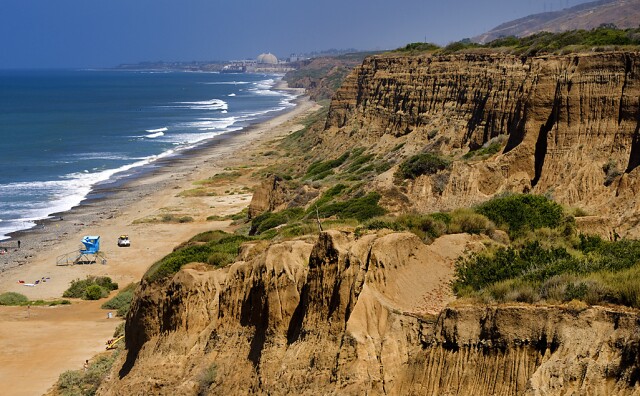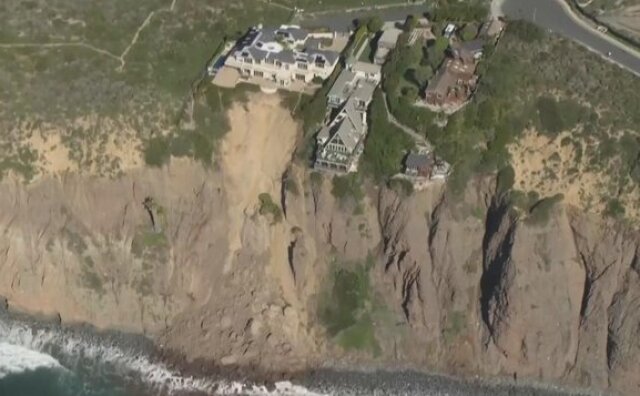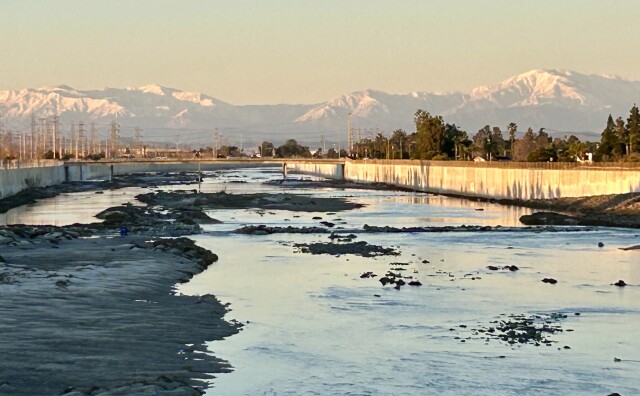California Plans To Ban Sales Of Gas-Powered Cars By 2035. Is It Doable?

The California Air Resources Board voted Thursday to implement the state's 2035 deadline requiring all new vehicles sold in the state to be either fully electric or hydrogen powered.
This puts California and a handful of other states that are expected to follow in a position to influence what auto and truck manufacturers are likely to provide. But with the supply chain problems, we've had shortages of materials for batteries and more. Is it possible to meet this 2035 deadline with exclusively 100% renewable energy?
Larry Mantle, who hosts our newsroom's public affairs show, AirTalk, which airs on 89.3 KPCC, talked to Gil Tal, director of the UC Davis Plug-In Hybrid and Electric Vehicle Institute, about what to expect.
First of all, the historic nature of this Air Resources Board vote today — how big is this?
-
At magnitude 7.2, buildings collapsed
-
Now spinning in front of Santa Monica apartments
-
Advocates seek end to new LAUSD location policy
It's big. We have a lot of commitments, a lot of goals, a lot of announcements, but once they will vote on it, it's in the law, it's in the books. It's legislation. It's actually happening. That's the difference.
I was wondering about unintended consequences. Newer cars are less polluting, and we ideally want to get older cars off the road. But given the higher cost for all electric vehicles, if that is still a significant differential by 2035, is that just going to incentivize people to keep older, higher polluting cars on the road longer?
It will, but in a very minor way. The cost of electric cars is dropping fast, and way before 2035, it will be the same or lower than gas cars. I know that some people will always keep their 1965 Mustang and so on, and that's perfectly okay. But I'm not expecting many people to [keep] the car they commute with every day, for it to be an old one if they can afford a new one.
With the charging infrastructure, supply chain issues, labor shortages, the minerals that are necessary for the batteries, the semiconductor shortage and so on, are we looking at all that, in the next decade, to be resolved?
Yes, [but] it's nothing that's going to be resolved in a day. The supply chain issues now are real, and people are waiting a long time for regular cars and even longer for electric cars. The infrastructure [will require] 10 to 15 years of building, and we'll need to build more and more.
But all of these things are going to be resolved. And by the way, we will allow a few gas cars on the road, even by 2035. California is banning cars that run only on gas, but about 20% will still be able to be plug-in hybrids that run on gas and electric. So people that still need unlimited range gas cars will be able to buy new ones, even in 2035.
A decade isn't a lot of time to significantly increase all the places people are going to need to plug in. Part of my skepticism about the ability to meet this deadline is whether we are really going to have that charging infrastructure ready to go, particularly for people who are apartment-dwellers or those for whom it's not going to be just a matter of running a line to the garage.
Yes, we will have to do a big investment. We are lucky that a lot of the infrastructure is already here, because we're talking about our electric infrastructure. Our usage of regular electricity is getting more and more efficient. We are more solar. So all we need is to add the chargers, and there are millions or even billions of dollars that are already allocated to it. We just need to remember that it's not a two or three year endeavor. We will have to keep investing for the next 10 to 15 years.
The investment will come from the federal, the state private entities, the car companies, the utilities that their business is selling electricity.
This mandate will be staged over time. It requires 35% of new passenger vehicles sold by 2026 to be zero emission, and then that requirement climbs to 68% by the year 2030. We're almost to 2023 now. That may be even more ambitious than than hitting all zero-emission vehicles by 2035.
Absolutely right. And it's even more ambitious than what it sounds because 2026 is 2026 model year, which will start in 2025. So it's really around the corner. But there are caveats. There's some fine print, that maybe we will need three out of 10 cars.
To be honest, I think that the main impact will be on the states that are not part of the new clean car initiative because there are enough cars in the U.S., but most of them will go to California and to the other states that follow California. States that are not following the California legislation will not find a lot of nice Teslas and Mustang Mach-E and the cool electric cars that are coming because of the supply issues. They will have to wait a little bit longer.
Typically, when California has set the pace for fuel standards or smog standards for cars, auto manufacturers have adopted that as a de facto national standard. Is that what you expect is going to happen here, or are we going to have two distinctly different car markets in the US.?
I believe that we will have two distinct car markets because of the supply chain, because it takes time to change. The car manufacturers are investing billions in the new technology in battery manufacturing. You hear a new announcement every week, but it's a long process. So the first to benefit from the process will be the people of California and the state of California. They will get these cars early and other states will just get it a little bit later. But it is happening all across the board.
Does this have an overall effect on CO2 emissions? If you're just sending to California all the electric vehicles that are available to meet demand, and then the states that don't have this mandate are getting gasoline engine cars, is this matter of sending different models to different parts of the U.S. not making an overall impact on fossil fuel emissions?
I haven't done a study on that, but I would guess that the states that follow California also have cleaner grid and they're getting cleaner every year. The nice thing about electric cars is that you buy one today and it will be even cleaner 10 years from now. The grid will be more clean, more renewables and so on. I think we'll actually have a net benefit for climate, greenhouse gasses and other emissions.
We have a question from a listener, who tweets: "What should we expect to see happen to all the gas stations in California? Is there talk of converting them to charging stations of course?"
Gas stations are disappearing in the U.S. already. And that's usually because of land use changes, because of the value of the land that they're sitting on. We will see these things keep happening slowly. But we'll have many, many gas cars on the road all the way to 2050. Gas stations are making money not just from gas so I'm expecting them to fade out very, very slowly. It will happen eventually. But it's a very slow process.
-
The state's parks department is working with stakeholders, including the military, to rebuild the San Onofre road, but no timeline has been given.
-
Built in 1951, the glass-walled chapel is one of L.A.’s few national historic landmarks. This isn’t the first time it has been damaged by landslides.
-
The climate crisis is destabilizing cliffs and making landslides more likely, an expert says.
-
Lifei Huang, 22, went missing near Mt. Baldy on Feb. 4 as the first of two atmospheric rivers was bearing down on the region.
-
Since 2021, volunteers have been planting Joshua tree seedlings in the Mojave Desert burn scar. The next session is slated for later this Spring, according to the National Park Service. Just like previous times, a few camels will be tagging along.
-
There are three main meteorological reasons why L.A. is so smoggy — all of which are affected when a rainstorm passes through and brings clearer skies.









